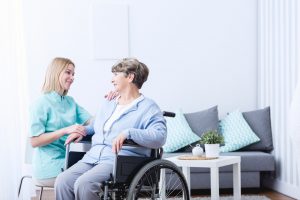Why Professional Caregiving is the Best Option for Reducing Senior Falls

Every 19 minutes, a senior dies from a fall. Falls account for the largest percentage of the total number of deaths among older adults. Nearly one in four U.S. residents aged 65 years or above report falling each year. Fall-related emergency visits number at approximately three million annually. Senior falls often lead to death or inability to perform routine activities, such as eating, toileting, bathing, walking, dressing, and being continent.
These stats are alarming and suggest that seniors at your home need your attention, love and care. Unfortunately, people are so busy with hectic jobs and day-to-day schedules that taking time off work to care for aging elderly parents is difficult.
Suffering from isolation, pre-existing disabilities, frailty or medical conditions, older adults are highly susceptible to falls. These falls can result in major injuries, such as hip fractures, lacerations or head trauma.
This is where caregivers help.
What do caregivers do to reduce a senior’s fall risk?
With professional caregivers, your senior loved ones don’t have to be alone. They work in a patient’s home or in a healthcare setting like residential facilities, daycares and long-term care facilities.
Here’s how caregivers support elderly adults and prevent them from potential falls:
Complete care planning
If a senior at your home shows signs of weakness and immobility, their chances of fall increase, especially when no one is around them. A professional caregiver remains by their side all the time to give them the required care and support. They create a care plan to manage health and home responsibilities by gathering input from family members and the senior’s doctor.
Help with personal hygiene and care
Approximately 80 percent of senior fall cases take place in the bathroom. Because of unforgiving and slippery surfaces, bathrooms are very dangerous for older adults in your home.
Caregivers help the elderly with more intimate tasks of daily life. They assist them with bathing, toileting, washing, combing hair, etc. Today, caregivers must be very kind-natured, patient and helpful. They don’t hesitate to handle hygiene care while working with older adults.
Assist with meals and nutrition
The poor nutritional status of many elderly adults is a determining factor in their risk of falling. Studies have confirmed that deficiencies in micro and macro nutrients are directly associated with increased fall risk among seniors.
Professional caregivers take complete care of an elderly adults’ nutritional needs. Some even handle grocery shopping, meal planning and food preparation – while sometimes working with a nutritionist to ensure all meals compliment the care plan created for the patient.
Emotional support and companionship
Honest and open communication between the patients and caregivers translates into an emotional relationship. Professional and genuine caregivers often use empathetic language to communicate with the patient. This emotional support and companionship keep seniors happy, healthy and strong.
Help with mobility
Whether it’s helping to move from wheelchair to toilet or noticing the signs of a potential fall, a skilled caregiver ensures safe movement both inside and outside the home. They know proper transfer methods to avoid injury to the senior adult.
This is how senior home care helps prevent fatal injuries due to falls, whichare very common among elderly persons. Caregivers not only keep the older adult in your home healthy and happy, but they ease your worries when you are too busy with jobs and kids to take care of elder loved ones.